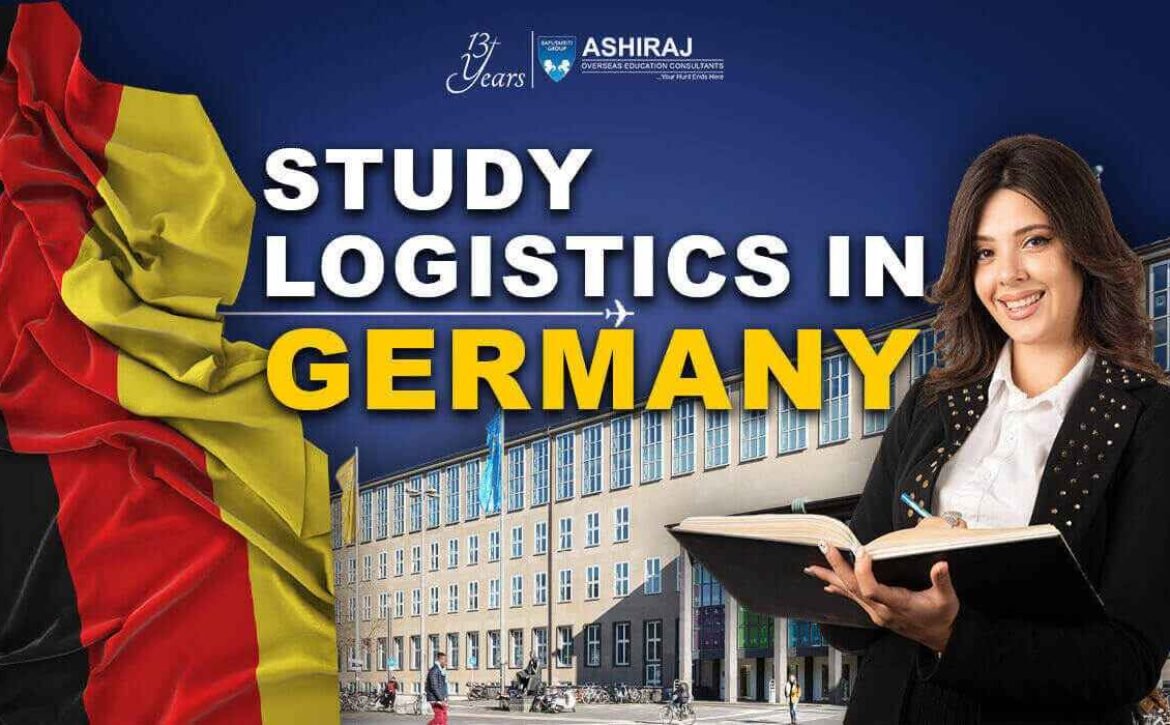
Logistics in Germany
Germany, a powerhouse in the heart of Europe, stands as a beacon of efficiency and precision when it comes to logistics. The term Logistics in GERMANY encapsulates a finely tuned system that seamlessly integrates transportation, warehousing, and distribution. Renowned for its robust infrastructure and strategic location, Germany serves as a logistical hub connecting global markets. The keyword Logistics in GERMANY reflects the nation’s commitment to excellence in supply chain management, where meticulous planning and cutting-edge technology converge to optimize the movement of goods.
In Logistics in GERMANY, the nation’s commitment to sustainability and innovation is evident. German logistics not only focuses on swift and reliable delivery but also places a significant emphasis on environmentally friendly practices. This holistic approach distinguishes Germany as a leader in the logistics landscape, where the keyword Logistics in GERMANY symbolizes a synthesis of precision, reliability, and forward-thinking solutions in the realm of supply chain management.
Why to Study Logistics in Germany?
- Global Logistics Hub: Germany, often referred to as the heart of Europe, serves as a global logistics hub, offering unparalleled exposure to diverse supply chains and international trade.
- Cutting-edge Technology: Students studying logistics in Germany benefit from access to state-of-the-art technology and innovative solutions, staying at the forefront of industry advancements.
- World-Class Education: German universities are renowned for their high-quality education. Pursuing logistics studies in Germany ensures a robust academic foundation and practical insights into the dynamic field.
- Strategic Location: The strategic geographical location of Germany enhances the learning experience. Students witness firsthand the intricate logistics network connecting Europe and beyond.
- Industry Collaboration: The German logistics sector maintains strong ties with academia, fostering collaboration that enables students to engage in real-world projects and internships, gaining invaluable hands-on experience.
- Sustainability Focus: Logistics in Germany emphasizes sustainability, aligning education with the growing global need for environmentally conscious supply chain practices.
- Career Opportunities: With a logistics degree from Germany, graduates enter a job market hungry for skilled professionals. The keyword Logistics in GERMANY encapsulates the nation’s prominence in providing lucrative career opportunities for logistics graduates.
Studying logistics in Germany opens doors to a world of opportunities, blending academic excellence with practical industry exposure and positioning graduates at the forefront of the global logistics landscape.
Top Universities to Study Logistics in Germany
University | QS World University Ranking 2023 | Type of University | Average Annual Fees | Programs Offered |
Technical University Munich | 50 | Public | €1500-€2000 | Logistics and Supply Chain Management, International Logistics |
University of Mannheim | 67 | Public | €1000-€2500 | Business Logistics, Global Supply Chain Management |
RWTH Aachen University | 76 | Public | €1000-€3000 | Production and Logistics Management, Supply Chain Engineering |
WHU – Otto Beisheim School of Management | Not Ranked | Private | €25,000-€30,000 | Master in Management – Logistics |
University of Stuttgart | 100 | Public | €1000-€2000 | Transport and Logistics, Business Administration |
When considering Logistics in GERMANY, the choice of university plays a pivotal role. The Technical University Munich leads the pack, ranked 50th globally, offering programs like Logistics and Supply Chain Management. The University of Mannheim, at 67th place, provides specialized courses in Business Logistics and Global Supply Chain Management. For those interested in the intersection of production and logistics, RWTH Aachen University, ranked 76th, offers programs like Production and Logistics Management. Private institution WHU focuses on Logistics in its Master in Management program. Lastly, the University of Stuttgart, ranked 100th, stands out for its courses in Transport and Logistics within the Business Administration field. Each university reflects the diverse opportunities available in Germany for those aspiring to excel in Logistics in GERMANY.
Course Curriculum for Logistics in Germany
- Comprehensive Foundation: The curriculum for Logistics in GERMANY provides students with a comprehensive foundation in supply chain management, covering key concepts, principles, and strategies.
- Technology Integration: Emphasis on cutting-edge technology integration is a hallmark of Logistics in GERMANY courses. Students engage with the latest tools and software used in the logistics industry, ensuring they are well-equipped for the digital era.
- Global Perspective: Logistics courses in Germany offer a global perspective, reflecting the country’s position as a logistics powerhouse. Students explore international trade, cross-border logistics, and the intricacies of managing supply chains on a global scale.
- Practical Application: The curriculum prioritizes practical application, with opportunities for internships, case studies, and real-world projects. This hands-on approach ensures that students can seamlessly transition from academia to the dynamic field of logistics.
- Sustainability Focus: Recognizing the importance of sustainable practices, Logistics in GERMANY courses integrate modules on eco-friendly logistics, green supply chain management, and the role of logistics in environmental conservation.
In summary, the course curriculum for Logistics in GERMANY stands out for its holistic approach, blending theoretical knowledge with practical skills and a global perspective. Aspiring professionals in the field benefit from a well-rounded education that aligns with the evolving demands of the logistics industry.
Eligibility Criteria & Admission Requirements for Logistics in Germany
- Language Proficiency: Fluency in English is a prerequisite. Applicants must provide proof of proficiency through either IELTS or TOEFL scores. A minimum IELTS score of 6.5 or a TOEFL score of 80 is commonly required for Logistics in GERMANY programs.
- Standardized Tests: Many universities in Germany consider standardized tests like GRE or GMAT. While not mandatory for all, a competitive score enhances the application. A GRE score of 310 or a GMAT score of 600 is often deemed favorable.
- Educational Background: Applicants should hold a bachelor’s degree in a relevant field, showcasing academic excellence. The degree should align with the prerequisites outlined by the specific logistics program.
- Passport & Student Visa: A valid passport is a must for international students. Upon acceptance, securing a student visa is imperative. The process involves providing proof of admission, financial stability, and a valid passport.
- Academic Certificates: Submission of academic transcripts and certificates from previous educational institutions is mandatory. These documents validate the applicant’s educational background and qualifications.
- Work Experience: While not universally required, some logistics programs prefer applicants with relevant work experience. Prior experience in logistics, supply chain management, or related fields can enhance the application.
Adhering to the eligibility criteria for Logistics in GERMANY ensures a smooth application process and sets the foundation for a successful academic journey in one of the world’s leading logistics hubs.
Documents Required for Studying Logistics in Germany
- Passport: A valid passport is essential for international students applying for Logistics in GERMANY programs. Ensure that your passport has sufficient validity throughout the duration of your studies.
- Letters of Recommendation (LOR): Typically, two LORs are required. These should come from academic or professional references who can attest to your skills, character, and suitability for the logistics program.
- Statement of Purpose (SOP): The SOP is a crucial document that outlines your motivations, career goals, and why you are interested in pursuing Logistics in GERMANY. It provides insight into your personality and aspirations.
- Curriculum Vitae (CV): A comprehensive CV detailing your academic and professional experiences, skills, and achievements is necessary. Tailor it to highlight relevant logistics-related experiences.
- Official High School Transcripts and Educational Certificates: These documents authenticate your academic background. Include transcripts and certificates from high school and any relevant academic qualifications.
- Work Experience Certificate: If applicable, provide a certificate validating your work experience in logistics or related fields. This adds value to your application, showcasing practical experience.
- Proof of Financial Resources: To support your application, furnish proof of financial stability. This can include bank statements, sponsorship letters, or scholarship notifications, ensuring you can sustain yourself during your studies.
Ensuring the meticulous preparation and submission of these documents is crucial for a successful application to Logistics in GERMANY programs, facilitating a smooth admission process.
Admission Process for Logistics in Germany
- Research Programs: Begin by researching Logistics in GERMANY programs offered by universities. Explore the curriculum, faculty, and specific requirements of each program.
- Check Eligibility: Ensure you meet the eligibility criteria, including language proficiency (IELTS or TOEFL), standardized test scores (GRE or GMAT), educational background, and any specific prerequisites for the logistics program.
- Prepare Documents: Gather necessary documents such as passport, Letters of Recommendation (LOR), Statement of Purpose (SOP), Curriculum Vitae (CV), official transcripts, educational certificates, and proof of financial resources.
- Online Application: Complete the online application form provided by the university. Upload all required documents and pay the application fee.
- Standardized Tests: If applicable, schedule and take the required standardized tests (IELTS, TOEFL, GRE, or GMAT). Ensure timely submission of test scores to the university.
- Submit Application: Submit the completed application along with all supporting documents before the deadline. Ensure accuracy and completeness to enhance the chances of acceptance.
- Wait for Admission Decision: Patiently wait for the admission decision. Universities typically communicate results through an online portal or official email.
- Acceptance and Visa: Upon acceptance, follow the university’s instructions for accepting the offer. Apply for a student visa, providing necessary documents, including the admission letter.
Navigating the admission process for Logistics in GERMANY requires attention to detail and adherence to deadlines. Following these steps diligently increases the likelihood of a successful application and entry into a renowned logistics program.
“Education is the most powerful weapon which you can use to change the world.”
Nelson Mandela
Cost of Logistics Course in Germany
- Tuition Fees: Logistics in GERMANY programs often have low to no tuition fees at public universities for international students. Some private institutions may charge fees, ranging from €1,000 to €30,000 per year.
- Living Expenses: Estimate living expenses, including accommodation, food, transportation, and miscellaneous costs. On average, students should budget around €800 to €1,200 per month.
- Accommodation: Housing costs vary. On-campus housing or shared apartments might be more budget-friendly, ranging from €300 to €600 per month. Cities like Munich or Frankfurt may have higher rental rates.
- Health Insurance: Health insurance is mandatory in Germany. Students can expect to pay around €80 to €100 per month for comprehensive coverage.
- Books and Supplies: Allocate funds for books, study materials, and other supplies. This could amount to approximately €500 per year.
- Language Courses: If required to improve language proficiency, consider the cost of language courses. Prices may range from €500 to €1,500.
- Miscellaneous Costs: Budget for unforeseen expenses, entertainment, and travel. This could be an additional €100 to €200 per month.
Understanding the cost of studying Logistics in GERMANY is essential for effective financial planning. Public universities often offer cost-effective options, making Germany an attractive destination for international students pursuing logistics education.
Scholarships for Logistics Courses in Germany
Scholarship Name | Amount (EUR) | Eligibility Criteria | Application Deadline |
DAAD Scholarships | Varies | Open to international students pursuing master’s or PhD in Logistics in GERMANY | Varies (Check DAAD website) |
Heinrich Böll Foundation | Up to 750 per month | Supports students committed to green values, applicable to Logistics programs | March 1st (Annually) |
Deutschland Stipendium | 300 per month | Merit-based scholarship for all nationalities pursuing Logistics in GERMANY | Varies (Check university website) |
Konrad-Adenauer-Stiftung | Varies | Open to postgraduate students demonstrating leadership potential | July 15th (Annually) |
Friedrich Ebert Foundation | Up to 850 per month | Available to students committed to social democracy and socio-political involvement | May 31st (Annually) |
For those aspiring to pursue Logistics in GERMANY, various scholarships cater to different needs and backgrounds. The DAAD Scholarships, open to international students, provide varying amounts to support master’s or Ph.D. pursuits. The Heinrich Böll Foundation emphasizes green values, offering financial aid for Logistics programs. Deutschland Stipendium is a merit-based scholarship available to students from all nationalities. The Konrad-Adenauer-Stiftung supports postgraduate students with leadership potential, and the Friedrich Ebert Foundation aids those committed to social democracy. As application deadlines vary, prospective students should carefully check each scholarship’s requirements and timelines to enhance their chances of securing financial support for their Logistics in GERMANY journey.
Career Opportunities After Logistics in Germany
Job Profile | Average Salary (EUR) | Description |
Logistics Manager | 60,000 – 90,000 | Overseeing supply chain processes, optimizing logistics operations, and ensuring timely delivery. |
Supply Chain Analyst | 50,000 – 75,000 | Analyzing supply chain data, identifying areas for improvement, and implementing efficiency measures. |
Operations Manager | 70,000 – 100,000 | Managing overall business operations, including logistics, to enhance productivity and profitability. |
Warehouse Supervisor | 40,000 – 60,000 | Supervising warehouse activities, coordinating staff, and implementing safety and efficiency measures. |
Transportation Coordinator | 45,000 – 70,000 | Coordinating transportation logistics, optimizing routes, and ensuring timely and cost-effective deliveries. |
After completing a degree in Logistics in GERMANY, graduates can explore diverse career opportunities with competitive salaries. A Logistics Manager, overseeing supply chain processes, can earn between 60,000 to 90,000 EUR annually. Supply Chain Analysts, responsible for data analysis and process optimization, earn an average of 50,000 to 75,000 EUR. Operations Managers, managing overall business operations including logistics, earn in the range of 70,000 to 100,000 EUR. Warehouse Supervisors, responsible for warehouse activities, can expect salaries between 40,000 to 60,000 EUR. Transportation Coordinators, optimizing transportation logistics, earn an average of 45,000 to 70,000 EUR. These lucrative career paths underscore the potential for professional growth and financial success for those venturing into Logistics in GERMANY.
Frequently Asked Questions About Logistics in Germany
Yes, many universities in Germany offer Logistics programs in English to cater to international students.
Admission requirements often include a bachelor’s degree, language proficiency (IELTS/TOEFL), and, in some cases, standardized test scores (GRE/GMAT).
Yes, various scholarships, such as DAAD Scholarships and Deutschland Stipendium, are available to support international students.
Tuition fees are often low to none at public universities. Living expenses range from €800 to €1,200 per month, depending on the city.
Master’s programs typically last 1.5 to 2 years, while Ph.D. programs may take 3 to 4 years to complete.
Yes, international students are allowed to work part-time, usually up to 20 hours per week during the semester.
Graduates can pursue careers as Logistics Managers, Supply Chain Analysts, Operations Managers, Warehouse Supervisors, and Transportation Coordinators.
While many programs are offered in English, learning basic German can enhance daily life and interactions.
Upon acceptance, apply for a student visa at the German embassy, providing necessary documents, including an admission letter and proof of financial resources.
Yes, Germany offers a post-study work visa that allows graduates to seek employment opportunities in the country after completing their studies.




